Most Americans report having strong emotional reactions to the Israel-Hamas war. Yet, for the most part, Americans are not paying very close attention to news about the conflict. One sign of this limited attention is that only about half of U.S. adults can correctly answer a question that tests their factual knowledge by asking whether the number of deaths in the war, so far, is higher among Palestinians or among Israelis. (The correct answer is that the death toll is higher among Palestinians.)
The fairly low level of attention to the war is also reflected in the relatively high shares of adults who express no opinion on many survey questions.
As has traditionally been true with international affairs, levels of engagement with this war vary greatly across social and demographic groups. In particular, Jewish and Muslim Americans are significantly more likely than other Americans to be following news about the conflict extremely or very closely.
Sadness, anger, exhaustion and fear
An overwhelming majority of U.S. adults (83%) say that hearing or reading news about the Israel-Hamas war makes them feel sad, and about two-thirds (65%) say news about the war makes them feel angry.
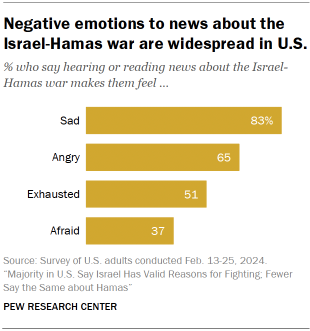
Half (51%) report exhaustion when reading or hearing about the war, while 37% say news about the war makes them feel afraid. Altogether, half of Americans say they experience at least three of these four emotions when reading or hearing news about the war.
While most Americans report at least some emotional reactions to the war, Jewish and Muslim Americans stand out, with 43% of Jews and 37% of Muslims reporting all four emotions – sadness, anger, exhaustion and fear – in response to the conflict. Three-quarters of Jews (74%) and two-thirds of Muslims (66%) experience at least three of the four strong emotions.
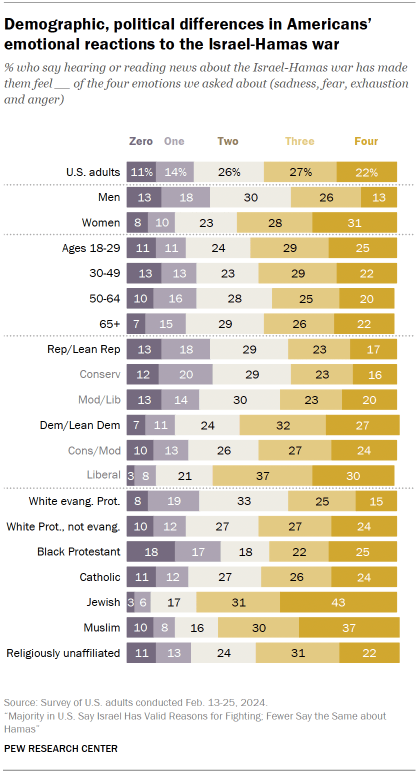
Women (59%) are much more likely than men (39%) to say they experience at least three of the four emotions.
The differences between men and women are especially wide on fear: 49% of women say reading or hearing news about the war makes them feel afraid, compared with 24% of men.
Differences by age are modest, except for feelings of exhaustion: Adults under 30 are the most likely to say this (60%), compared with 46% of those 50 and older.
A solid majority of Democrats and Democratic-leaning independents (59%) say they feel at least three of the four emotional reactions, while 40% of Republicans and Republican-leaning independents say the same.
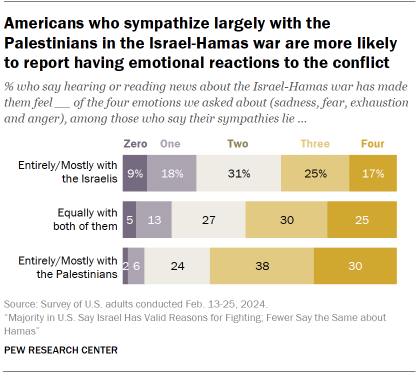
These differences are even sharper when considering ideology along with partisanship: 67% of liberal Democrats report experiencing at least three emotional reactions, compared with 39% of conservative Republicans.
Emotional reactions are related to opinions about the conflict.
Those who express sympathy entirely or mostly with the Palestinian people are more likely than those who sympathize with the Israeli people (or who sympathize with both equally) to report experiencing the four emotions.
Attention to news about the war
Most people are not paying close attention to the Israel-Hamas war. The survey finds that 22% of U.S. adults say they have been following news about the war extremely or very closely, while 35% say they are following it somewhat closely, and 43% are following not too or not at all closely.
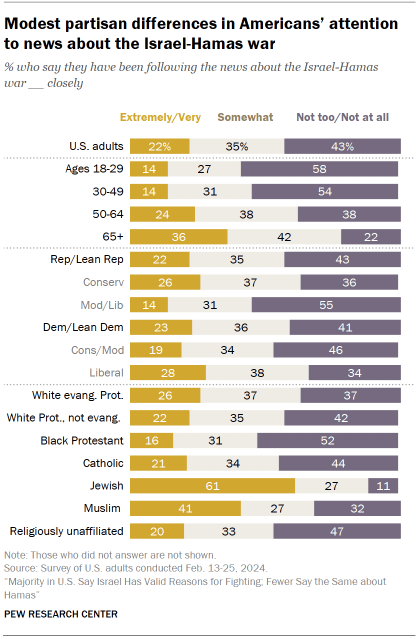
This level of public attention is basically unchanged from a survey conducted Nov. 27-Dec. 3, 2023, less than two months after the Oct. 7 attack on Israel by Hamas. In that survey, 26% were following news about the conflict extremely or very closely.
Attention to news about the Israel-Hamas war is comparable in magnitude to attention to news about Russia’s invasion of Ukraine.
One-fifth of Americans report following the Russia-Ukraine conflict extremely or very closely, while 35% are following it somewhat closely. (Americans also describe the Israel-Hamas war and the Russia-Ukraine war as similarly important to U.S. national interests, according to a separate Center survey conducted in January, though slightly more describe the Israel-Hamas war as personally important to them. For more, read “How Americans view the conflicts between Russia and Ukraine, Israel and Hamas, and China and Taiwan.”)
One other point of comparison is news about the 2024 U.S. presidential election. Somewhat more Americans – though still not a majority – report following election news extremely or very closely (32%). Around a third (35%) say they are following the election not too or not at all closely.
Religion
Some groups are paying much greater attention to news about the Israel-Hamas war. Jews and Muslims report especially high levels of attention. About six-in-ten Jewish Americans (61%) say they are following the war extremely or very closely, as are 41% of Muslim Americans. In no other religious or nonreligious group analyzed do more than around a quarter report this high level of attention.
Party affiliation
Attention to news about the war is very similar among Republicans and Democrats: 22% and 23%, respectively, say they’re following it extremely or very closely. More of those who describe themselves as either conservative Republicans (26% following extremely or very closely) or liberal Democrats (28%) are paying close attention than are either moderate and liberal Republicans (14%) or moderate and conservative Democrats (19%).
Sympathies in the conflict
U.S. adults who say they sympathize equally with Israelis and Palestinians in the conflict are paying less attention than those who express greater sympathy for one side or the other. Among those who sympathize equally with the Israeli and Palestinian people, 21% are following news about the war extremely or very closely. Among those who sympathize more with the Israeli people, 32% are following extremely or very closely, as are 31% of those who sympathize more with the Palestinian people.
Note: It’s important to highlight that the connections between emotions, news and knowledge discussed in this chapter may be more complicated than a simple case of one thing directly causing another. For example, it could be that people who begin with a strong sympathy for either side in the Israel-Hamas war are more likely to pay attention to news about the war. But it also could be that people who pay close attention to the news about the war are more likely to develop a sympathy for one side or the other. Or, both things may be happening at the same time. Survey research often shows associations without being able to determine causality.
Age
There are sizable differences in attention to the Israel-Hamas war by age. Limited attention to news about the conflict is seen not only in the youngest age group but also among all adults under 50. Just 14% of adults under 30, as well as 14% of those ages 30 to 49, report paying extremely or very close attention to news about the conflict. This compares with 24% of people ages 50 to 64 and 36% of those 65 and older.
Young Democrats are paying a little more attention to the war than are young Republicans, but there is an especially sharp difference in the share who are very disengaged: Republicans under age 30 stand out, with 71% reporting that they are following news about the war not too or not at all closely. Among Democrats in this age group, fewer – 49% – are similarly disengaged.
Knowledge about the conflict
The historical roots of the conflict in Gaza are deep and complicated, so it is unsurprising that many Americans have trouble formulating opinions about the war.
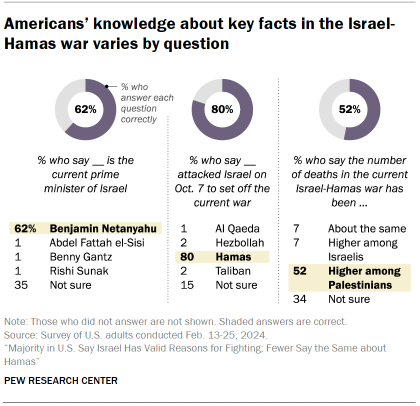
To get a sense of what people know about the situation, we asked the poll’s respondents three factual questions in a multiple choice format. These questions tested whether respondents know that Benjamin Netanyahu is Israel’s current prime minister; that Hamas is the group that attacked Israel on Oct. 7 (the survey asked this question before making any other mention of Hamas); and that more Palestinians than Israelis have died thus far in the current war.
These questions are merely indicators of basic knowledge. One could know all three facts without understanding the complex historical and geopolitical forces at work in the conflict. Nevertheless, it can be informative to look at the interplay between specific knowledge about the current Israel-Hamas war and broader attitudes about the conflict.
A solid majority of respondents (80%) correctly chose Hamas as the group that attacked Israel; alternative choices included Hezbollah, Al Qaeda and the Taliban.
Benjamin Netanyahu was correctly chosen by 62% of Americans as the Israeli prime minister (the alternatives included Rishi Sunak, Benny Gantz and Abdel Fattah el-Sisi). Hardly anyone gave a wrong answer; instead, 35% said they were not sure of the right answer.
And 52% correctly answered that more Palestinians than Israelis have died in the war thus far. Most people are not misinformed: Just 7% said more Israelis have died, and an additional 7% said the number of deaths had been about the same. But 34% said they were not sure of the answer.
Summary index of knowledge
The three questions were combined to form a simple index of knowledge related to the conflict. A little more than four-in-ten people surveyed (43%) answered all three items correctly, while 24% got two out of three. About a third (34%) answered fewer than two items correctly.
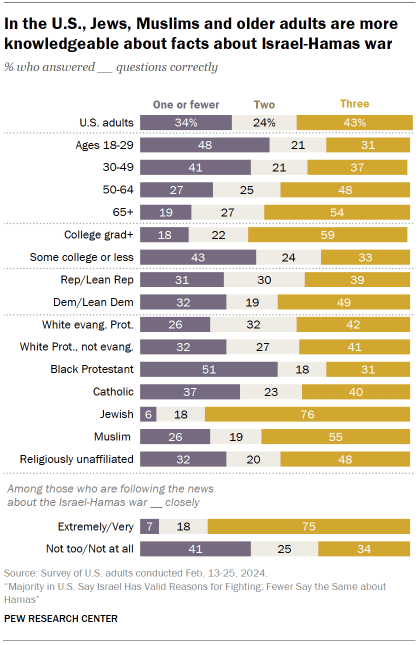
Not surprisingly, people who say they’re following news about the conflict extremely or very closely are far more likely to answer all three knowledge questions correctly: 75% could do so, compared with just 34% among those following less closely.
Consistent with their high levels of attention to news about the conflict, American Jews and Muslims were more likely than many other religious groups to correctly answer all three items (76% for Jews, 55% for Muslims).
Among the religiously unaffiliated, 48% got all three questions right – with atheists (69%) and agnostics (60%) particularly standing out.
As with most tests of political knowledge, people with more formal education scored higher than those with less education: 59% of college graduates answered all three questions correctly, compared with 33% of adults with no college degree.
Older respondents generally were more knowledgeable than younger ones. Roughly half of those ages 65 and older (54%) answered all three questions correctly, compared with 31% of those under 30.
And 56% of men got all three questions right, compared with 30% of women. Women were not more likely than men to answer incorrectly, but they were much more likely to indicate they were unsure of the correct answers.
Democrats were a little more knowledgeable, on average, (49% got all three correct) than Republicans (39%), with self-described liberal Democrats the most knowledgeable (60%).
A closer look at knowledge of casualties
Knowledge – or lack of knowledge – about casualties is related to attitudes about the conflict in a few ways. For a start, respondents who do not correctly answer that more Palestinians than Israelis have died are much more likely to decline to answer many opinion questions in the survey.
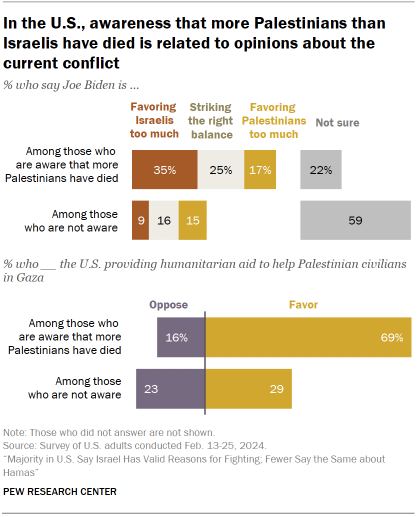
For example, among those unaware that more Palestinians have died, 59% offered no opinion when asked whether Biden has been favoring one side or the other too much. Among those who knew the balance of casualties, far fewer – 22% – had no opinion on Biden’s approach to the war.
In addition, those who are aware that more Palestinians than Israelis have died in the current war tend to express more pro-Palestinian views on certain questions. One example is that they express more favorable attitudes about the Palestinian people than do respondents who are not aware of the relative number of deaths on each side. Among those who correctly answer this knowledge question, favorable opinions of the Palestinian people outnumber unfavorable opinions by 61% to 36%; among those unaware of the balance of casualties, more have an unfavorable than favorable opinion of the Palestinian people (47% unfavorable, 39% favorable).
Similarly, those aware that more Palestinians have died are about twice as likely to say Biden is favoring the Israelis too much (35%) as to say he’s favoring the Palestinians too much (17%). Among those who do not know that more Palestinians have died, 15% say Biden is favoring the Palestinians too much and 9% say he’s favoring the Israelis too much.
And by 69% to 16%, those who know that more Palestinians have died favor the U.S. providing humanitarian aid to Palestinian civilians in Gaza. Among those who do not know the balance of casualties, 29% favor providing aid and 23% oppose it.
American Jews (79%), Muslims (71%), atheists (80%) and agnostics (72%) were the most knowledgeable religious groups analyzed on this question. As with our knowledge index overall, older adults were more likely than younger ones to correctly answer this question, but the gap was smaller than on the other knowledge items. Democrats were more knowledgeable than Republicans about the death toll in the war (60% and 46%, respectively, answered correctly).




